The new Horizon 60ED imaging refractor from Rother Valley Optics is a lightweight, portable telescope designed for grab and go astronomy. The full imaging package we received for review includes a guidescope and a field flattener for astrophotography, although the telescope is also available on its own without accessories for a price of £499.
The portability of the Horizon imaging package is particularly impressive. Supplied in a sturdy case that contains the whole assembly, the only extras required for an astrophotography trip would be a DSLR camera and a suitable telescope mount.
The complete setup, including a DSLR, weighs less than 3kg, so it could be easily accommodated by most star-tracking mounts.
Browse more telescope reviews
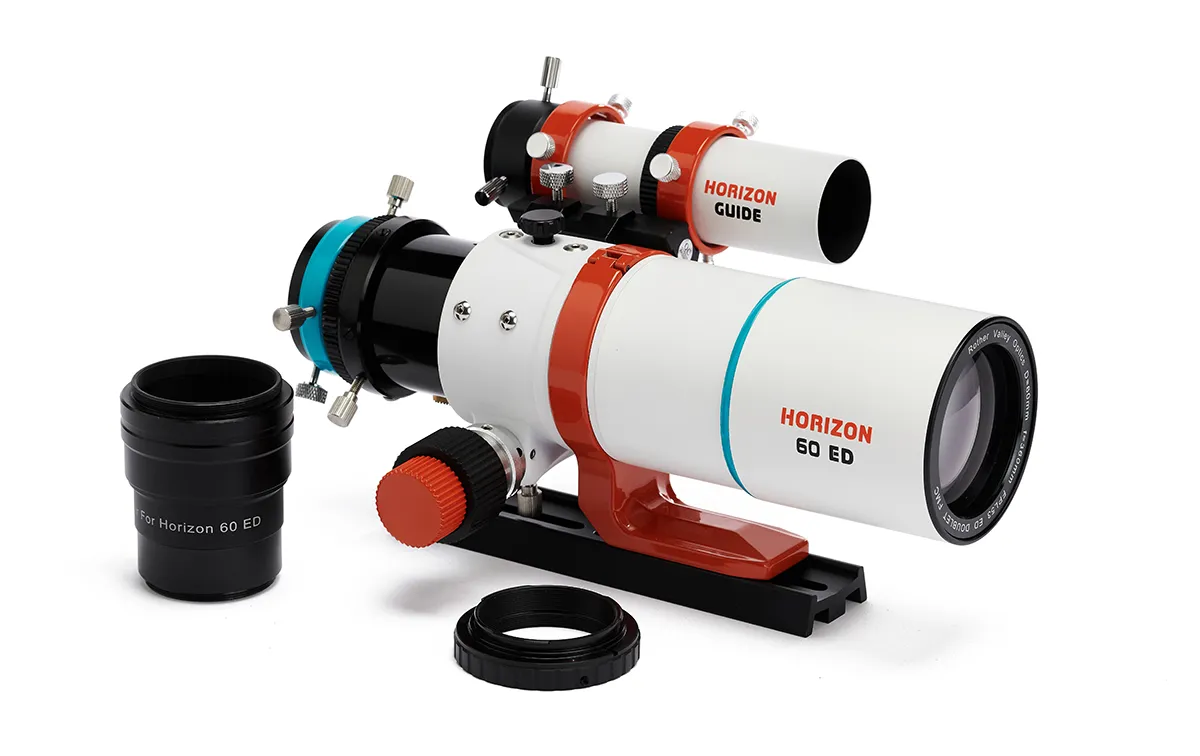
Setting up the Horizon 60ED imaging refractor for an imaging session is quick and simple, and first-time users will appreciate the easy to follow, three-step pictorial guide, which explains how to remove the visual back from the telescope and replace it with the field flattener.
A standard 48mm T-ring screws on to the back of the field flattener, and the DSLR camera attaches onto that, which gives optimal spacing for a flat image field with no additional spacers or measuring required.
The telescope features a 60mm objective lens, and a focal length of just 360mm, which offers a wide-field image scale at a respectable f/6 focal ratio.
Our full-frame DSLR camera was able to capture the three stars in Orion’s Belt right down to his Sword, including the impressive Orion Nebula, M42.
At this image scale, guiding the telescope over typically short DSLR exposures might not strictly be necessary on a mount with good polar alignment, but the supplied 32mm guidescope is a useful standby, which can be adjusted easily to match the imaging area, or perhaps to track on a comet while taking photos.
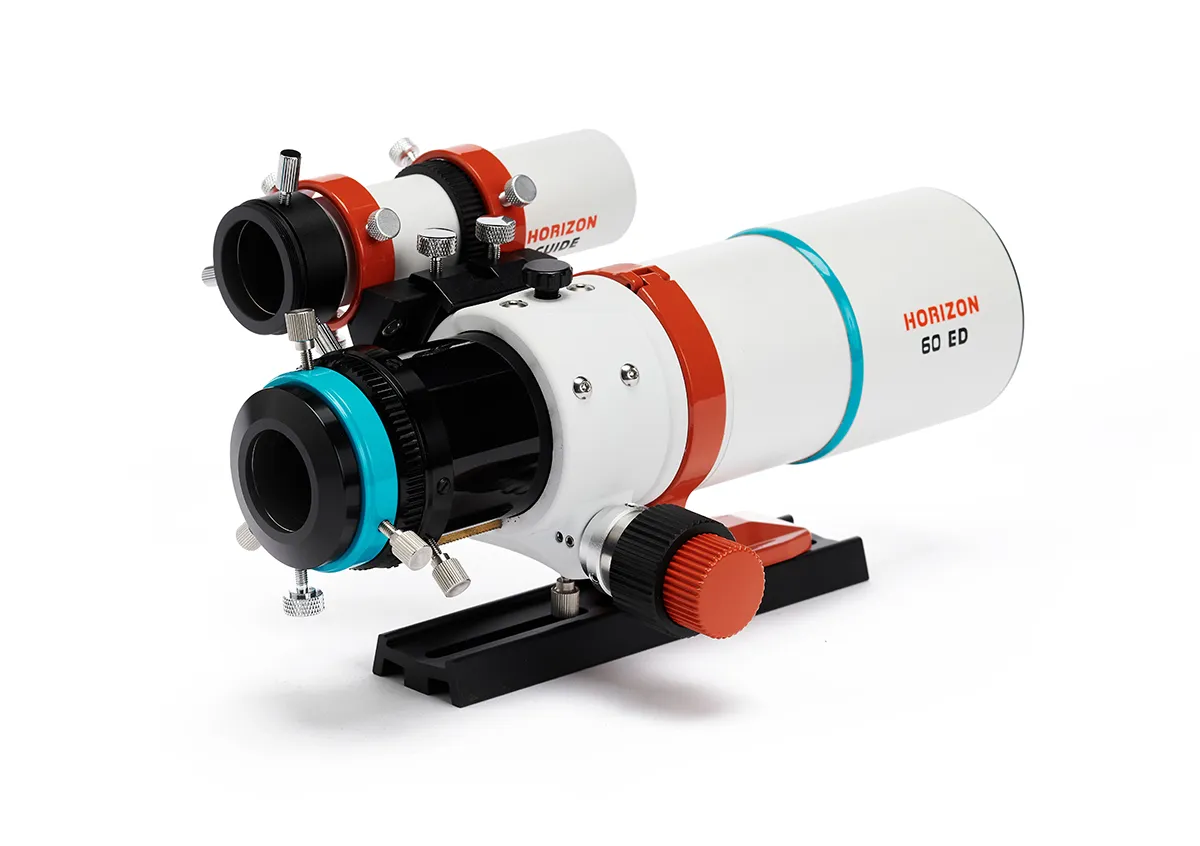
Guide cameras with 1.25-inch nosepieces slide into the guidescope and can be adjusted back and forth to achieve focus. Alternatively, an M42 x 0.75mm male thread on the guidescope’s rear allows you to attach other cameras.
With everything set up and ready to go in just a few minutes, we turned our attention to capturing some images.
Focusing our DSLR was very straightforward too with the dual-speed option, and although the focus lock knob was a little awkward to access with cold fingers, once locked the focus held well in stable temperatures.
With the comparatively wide view available to the camera, we wanted to frame each shot for best effect, and this was easily accomplished with the built-in rotator.This sits in front of the field flattener, a single thumbscrew allowing the camera to rotate 360°.
Once set, we started taking images within the constellation of Orion, the Hunter to assess the performance of the field flattener.
This proved to be remarkably good, especially given our full-frame camera, with just a little distortion to star shapes in the corners of the image.
Indeed, the reassurance that the camera and scope were nicely matched allowed us to get on with astrophotography, no fiddling about required – exactly what we look for in a portable setup.
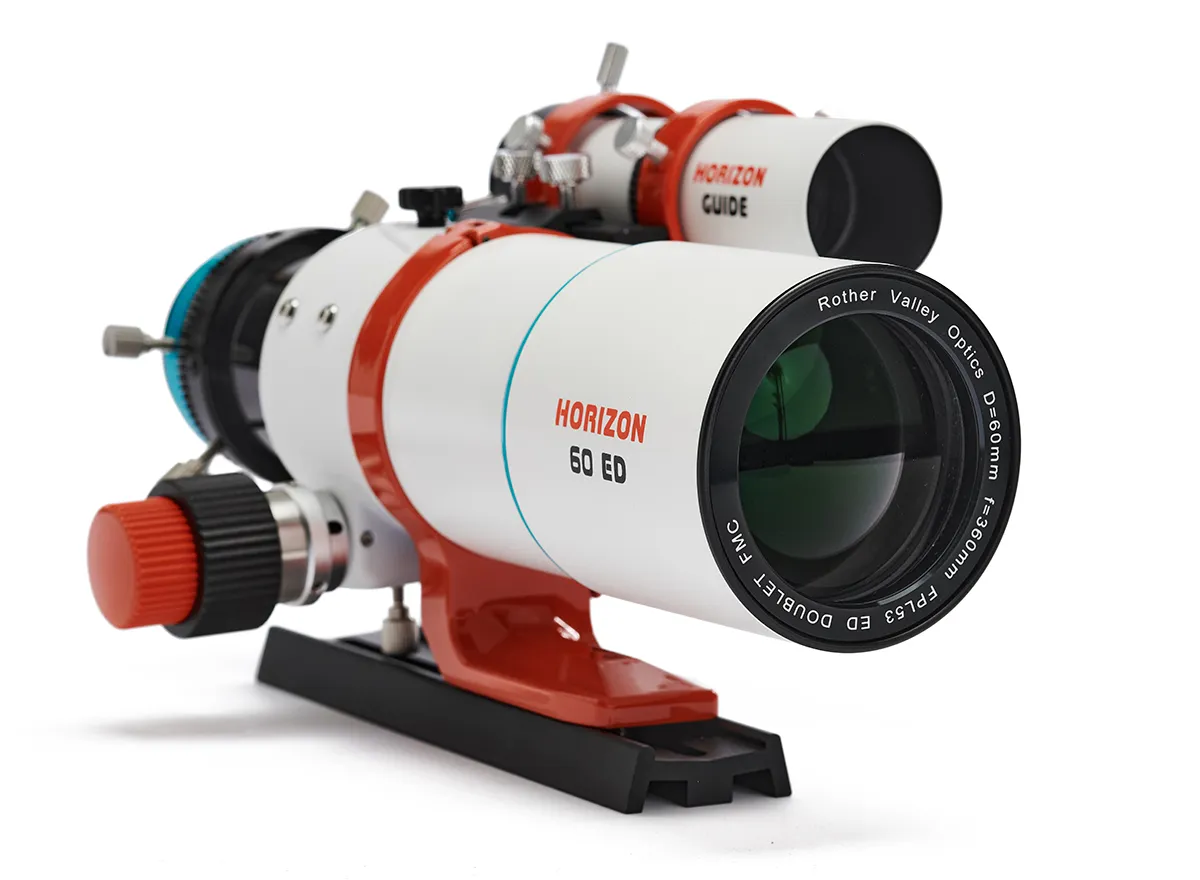
Removing the flattener and reattaching the visual back allowed us to use our 2-inch diagonal and eyepieces for a visual observing session, as a bright Moon dominated the sky.
Our 13mm, 100° apparent-field-of-view eyepiece offered us around 28x magnification; ideal for exploring large star clusters like the Pleiades, M45, where we noted a nice contrast and good star shapes across most of the view.
Despite the bright Moon we were able to pick out a good amount of nebulosity around the Orion Nebula, M42, and moving down through 10mm and 5mm eyepieces the Trapezium area was clear and sharp.
Although primarily aimed at the astrophotography community, we found the Horizon 60ED offered pleasing, encompassing views, allowing the viewing of familiar targets in their wider context.
Overall, we were pleased to discover that the Horizon 60ED refractor is a well-priced, very capable astrophotography telescope – in an extremely portable package – with the added bonus of pleasant visual observing as an option.
The photographs, and indeed the views, provided by any telescope are only as good as the optical system allows.
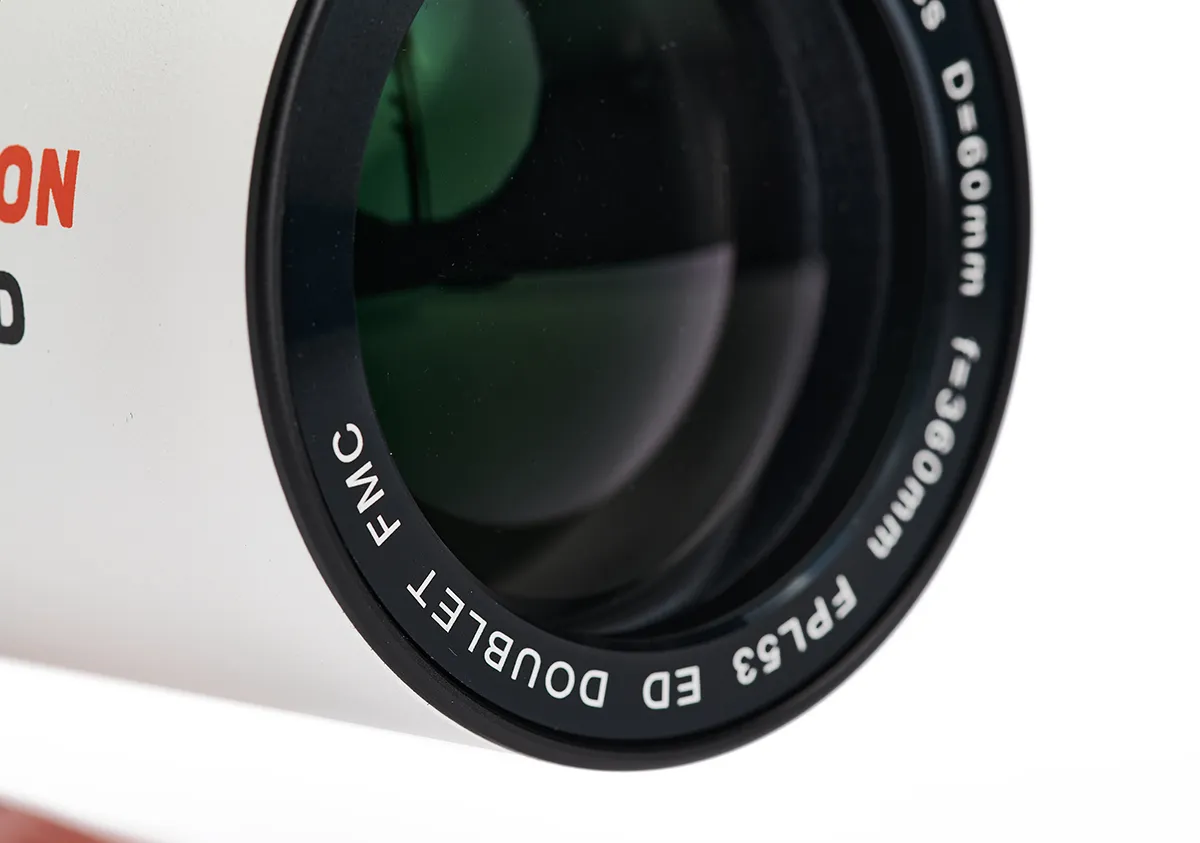
RVO Horizon 60ED colour correction
With refractors like the Horizon 60ED the two main considerations for optical quality are the flatness of the image – or how well the curved lens produces focused, round stars in the corners – and colour correction.
As light enters the telescope through the lens, its various wavelengths behave slightly differently and the point of focus alters for each wavelength.
The lens arrangement in the Horizon 60ED is an FPL-53 doublet and this very low-dispersion glass lens system has been figured to provide excellent colour correction.
This was demonstrated nicely while we were imaging the Orion area; the bright blue star Alnitak (Zeta (ζ) Orionis) in Orion’s Belt has a reputation for revealing any weaknesses in optical designs, but we found no issues.
To confirm these results, we spent some time observing and imaging the bright edge of a waxing Moon and were pleased to see that no false colour artefacts or colour fringing were visible.
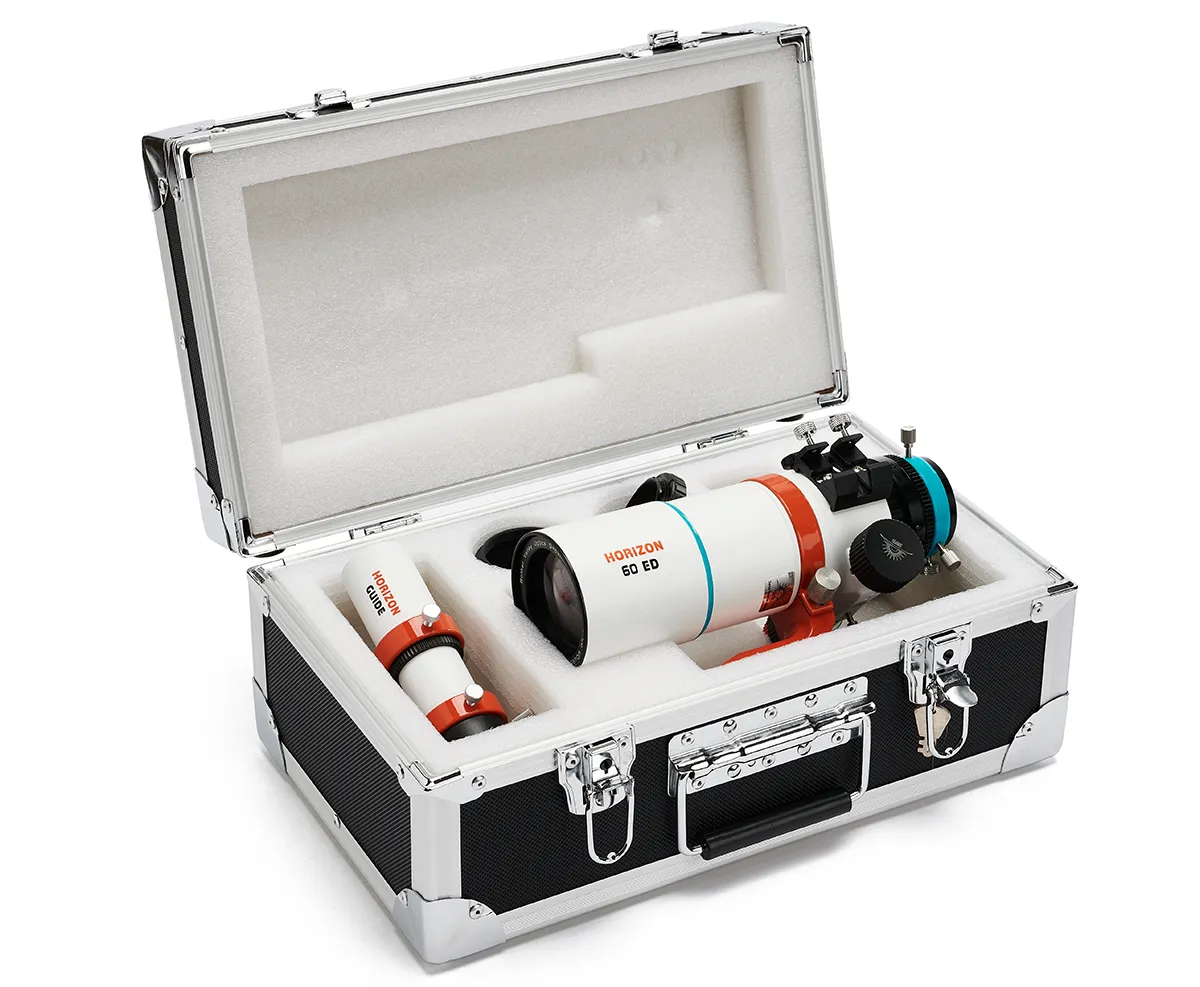
RVO Horizon 60ED outstanding features
Dew shield and internal baffles
A retractable dew shield extends 50mm beyond the objective lens, protecting it from stray light and moisture while maintaining the compact profile of the Horizon 60ED. The inside of the tube features a baffled section to further reduce unwanted internal reflections. In addition, the aluminium end cap is etched with the RVO logo.
Field flattener
The dedicated field flattener screws directly onto the focuser drawtube, and the camera T-ring screws onto the back
of it, helping to eliminate unwanted flexure. This extra lens adjusts for the effects of residual coma in the objective, ensuring stars in the corners of the image are tight and round.
Guidescope
With its own dovetail and tube rings that match the main telescope, this handy little 32mm guidescope is quickly attached to the Horizon 60ED, and with the help of an eyepiece it’s easily aligned to the same axis. We found plenty of suitable guide stars were available through the guidescope.
Focuser
The Horizon focuser is a rack and pinion dual-speed design, which is compatible with auto-focusers. In addition to the handy camera angle adjuster (CAA), or rotator, there is a useful tension adjuster on top of the focuser to accommodate and adjust the focuser for a range of cameras and visual accessories.
Carry case
The stylish aluminium carry case will neatly house the telescope, guidescope, dovetail bars and field flattener with room for more, and protect the scope during storage and travelling. It is lightweight and lockable, measuring just 41 x 23.5 x 18cm, well within the limits for airline cabin baggage.
Vital stats
- Price £695
- Optics FPL-53 Doublet
- Aperture 60mm
- Focal length 360mm, f/6
- Focuser 2-inch rack and pinion with camera angle adjuster
- Extras Dovetail bars, tube clamp, guidescope
- Weight 1.78kg
- Supplier Rother Valley Optics
- Tel 01909 774521
- www.rothervalleyoptics.co.uk
This review originally appeared in the May 2021 issue of BBC Sky at Night Magazine.
